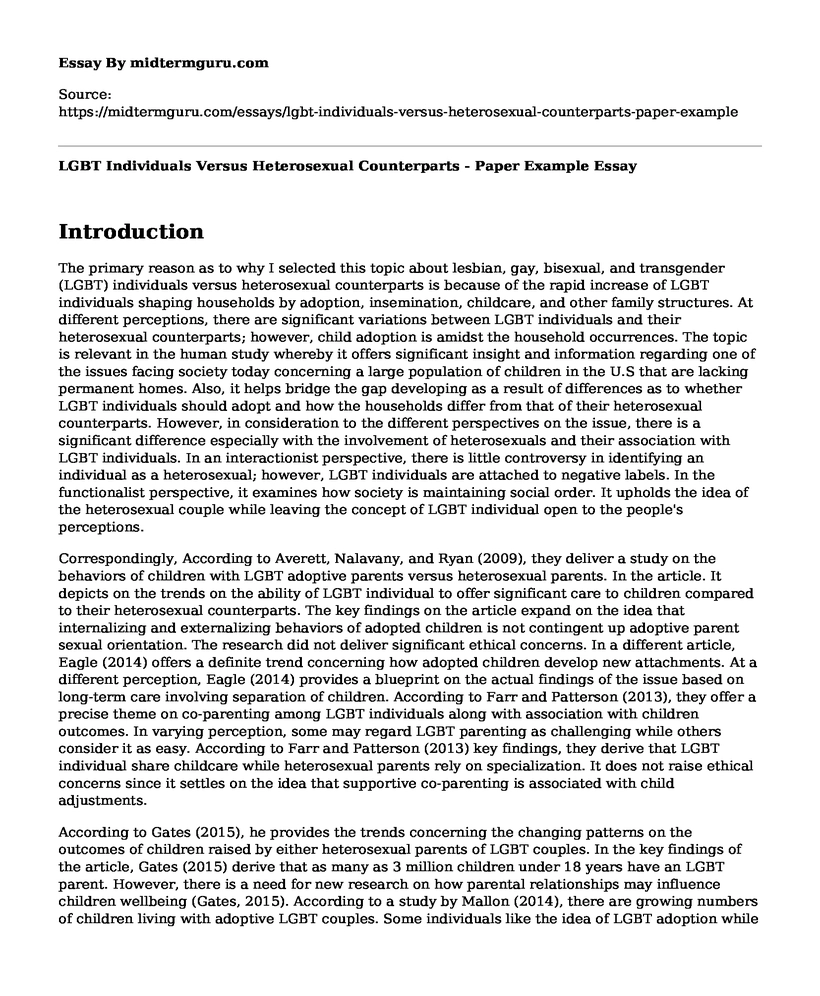Introduction
The primary reason as to why I selected this topic about lesbian, gay, bisexual, and transgender (LGBT) individuals versus heterosexual counterparts is because of the rapid increase of LGBT individuals shaping households by adoption, insemination, childcare, and other family structures. At different perceptions, there are significant variations between LGBT individuals and their heterosexual counterparts; however, child adoption is amidst the household occurrences. The topic is relevant in the human study whereby it offers significant insight and information regarding one of the issues facing society today concerning a large population of children in the U.S that are lacking permanent homes. Also, it helps bridge the gap developing as a result of differences as to whether LGBT individuals should adopt and how the households differ from that of their heterosexual counterparts. However, in consideration to the different perspectives on the issue, there is a significant difference especially with the involvement of heterosexuals and their association with LGBT individuals. In an interactionist perspective, there is little controversy in identifying an individual as a heterosexual; however, LGBT individuals are attached to negative labels. In the functionalist perspective, it examines how society is maintaining social order. It upholds the idea of the heterosexual couple while leaving the concept of LGBT individual open to the people's perceptions.
Correspondingly, According to Averett, Nalavany, and Ryan (2009), they deliver a study on the behaviors of children with LGBT adoptive parents versus heterosexual parents. In the article. It depicts on the trends on the ability of LGBT individual to offer significant care to children compared to their heterosexual counterparts. The key findings on the article expand on the idea that internalizing and externalizing behaviors of adopted children is not contingent up adoptive parent sexual orientation. The research did not deliver significant ethical concerns. In a different article, Eagle (2014) offers a definite trend concerning how adopted children develop new attachments. At a different perception, Eagle (2014) provides a blueprint on the actual findings of the issue based on long-term care involving separation of children. According to Farr and Patterson (2013), they offer a precise theme on co-parenting among LGBT individuals along with association with children outcomes. In varying perception, some may regard LGBT parenting as challenging while others consider it as easy. According to Farr and Patterson (2013) key findings, they derive that LGBT individual share childcare while heterosexual parents rely on specialization. It does not raise ethical concerns since it settles on the idea that supportive co-parenting is associated with child adjustments.
According to Gates (2015), he provides the trends concerning the changing patterns on the outcomes of children raised by either heterosexual parents of LGBT couples. In the key findings of the article, Gates (2015) derive that as many as 3 million children under 18 years have an LGBT parent. However, there is a need for new research on how parental relationships may influence children wellbeing (Gates, 2015). According to a study by Mallon (2014), there are growing numbers of children living with adoptive LGBT couples. Some individuals like the idea of LGBT adoption while others do not like the idea at all. The key findings according to Mallon (2014) are based on the different themes between LGBT and heterosexual individuals. According to Moore and Stambolis-Ruhstorfer (2013), there is a significant shift in the themes concerning progress for LGBT couples adopting children. In the 21st century, there are trends in the growth of LGBT couples alongside the adoption of children. Various individuals support the involvement of LGBT couple in the adoption of children while others feel they should not be allowed to adopt. The key findings rely on future directions on family dynamics for both LGBT couples and heterosexual individuals. In conducting the research, ethical concerns about the difference in heterosexual and LGBT households is a concern that was addressed.
References
Averett, P., Nalavany, B., & Ryan, S. (2009). An evaluation of gay/lesbian and heterosexual adoption. Adoption Quarterly, 12(3-4), 129-151. DOI: 10.1080/10926750903313278
Eagle, R. S. (2014). The separation experience of children in longterm care: Theory, research, and implications for practice. American Journal of Orthopsychiatry, 56-321.
Farr, R., & Patterson, C. (2013). Co-parenting Among Lesbian, Gay, and Heterosexual Couples: Associations with Adopted Children's Outcomes. Child Development, 84(4), 1226-1240. doi: 10.1111/cdev.12046
Gates, G. (2015). Marriage and Family: LGBT Individuals and Same-Sex Couples. The Future of Children, 25(2), 67-87. doi: 10.1353/foc.2015.0013
Mallon, G. P. (2014). Lesbian, gay, bisexual, and transgender (LGBT) families and parenting. Encyclopedia of social work [E-reader version]. Washington, DC, and New York: National Association of Social Workers and Oxford REFERENCES R-13. DOI:10.1093/acrefore/9780199975839.013.158
Moore, M., & Stambolis-Ruhstorfer, M. (2013). LGBT Sexuality and Families at the Start of the Twenty-First Century. Annual Review of Sociology, 39(1), 491-507. doi: 10.1146/annurev-soc-071312-145643
Cite this page
LGBT Individuals Versus Heterosexual Counterparts - Paper Example. (2022, Sep 26). Retrieved from https://midtermguru.com/essays/lgbt-individuals-versus-heterosexual-counterparts-paper-example
If you are the original author of this essay and no longer wish to have it published on the midtermguru.com website, please click below to request its removal:
- The Theme of Gender and Sexuality in Ancient Rome - Essay Sample
- A Framework for Child Sexual Health Improvement in England: Changing Community Understanding Of Sexual Violence
- Argumentative Essay on Same-Sex Marriage in Hawaii
- Sex Trafficking: Hidden Profits and Exploitation - Essay Sample
- Child Mistreatment: Causes & Effects of Intergenerational Abuse - Research Paper
- Article Analysis Essay on Homosexuality and the PIB Argument
- The Debate Over Homosexuality: 10% Of World's Population Affected - Essay Sample







